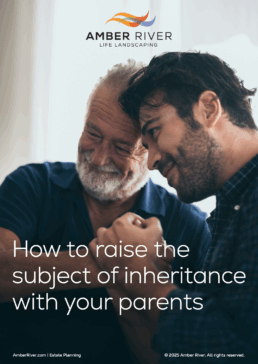For many people, their pension is one of the most valuable assets they’ll ever own. Since the pension freedoms were introduced in April 2015, it’s also become a key part of how families pass on wealth, often viewed as one of the most tax-efficient ways to leave money to the next generation.
But from April 2027, that picture is set to change.
Under new government proposals, any unused pension funds left on death will usually be counted as part of your estate for Inheritance Tax (IHT) purposes.
That means your beneficiaries could face a tax charge of up to 40% on your remaining pension. And, if you die after 75, they may also pay income tax when they draw the funds. In other words, your pension could soon be taxed twice.
So, what exactly is changing, and how might it affect what your children inherit?
Can I leave my pension to my children?
In most cases, yes. You can pass your pension on to your children, spouse, or any other beneficiary you choose.
If you have a defined contribution pension (a personal pension), the funds you’ve built up can normally be paid to whoever you’ve nominated. They can choose to take the pension as a lump sum, an income, or leave it invested for their own retirement.
Defined benefit (final salary) pensions, on the other hand, work differently. These usually provide an income for a surviving spouse, civil partner, or sometimes a dependent child, but you can’t normally pass the fund itself to your children.
Whichever type you have, it’s essential to complete a nomination (or expression of wish) form with your pension provider. This tells the scheme who should receive your pension when you die. You can update it at any time, which is particularly important if your family circumstances change.
You can name your children as beneficiaries on your pension nomination form. This ensures your pension can be paid directly to them when you die.
How pensions are taxed on death under current rules (before 2027)
At the moment, pensions are one of the most tax-efficient assets to leave behind.
- If you die before age 75:
Your beneficiaries can usually take your pension benefits tax-free. - If you die after age 75:
Any withdrawals they make from your pension are taxed as income at their marginal rate (for example, 20%, 40%, or 45%). - For IHT:
Most pensions currently sit outside your estate, so they’re not included when calculating any IHT due.
This favourable treatment is one of the main reasons many advisers have historically encouraged clients to spend other assets first, preserving their pensions as a legacy for family members.
What’s changing from April 2027?
From 6 April 2027, most unused pension funds will be counted as part of your estate for IHT purposes.
That means when you die, the value of your remaining pension will be added to everything else you own – your home, savings, and other investments. If the total value exceeds the IHT threshold, your estate could face a 40% tax charge on the excess.
The government estimates that around 4.6% of UK deaths currently result in an IHT charge. With the inclusion of most unused pension funds from April 2027, the government estimates an additional 10,500 estates will have to pay IHT for the first time. Some analysts predict the overall rate of estates paying IHT could rise to around 9%–10% of deaths by the end of the decade.

How the IHT allowances work
For married couples and civil partners, anything you leave to your spouse or civil partner is completely exempt from IHT, no matter how large your estate. In addition, when the first partner dies, any unused tax allowances can be transferred to the surviving partner.
This means that when the second partner passes away, their combined estate can be worth up to £1 million before any IHT is due. That figure is made up of:
- The standard nil rate band of £325,000 per person, plus
- The residence nil rate band (RNRB) of £175,000 per person, if the family home is passed on to direct descendants.
So, if you’re part of a couple and your home, savings, investments and pension are worth less than £1 million when the second partner dies, your estate won’t usually face any IHT.
However, if you’re single or divorced, the picture is different.
In these cases, your total IHT allowance is capped at £500,000 – that’s your personal £325,000 allowance plus the £175,000 residence allowance (if applicable).
And with property prices rising sharply over the past 30 years, many single people now find themselves accidentally crossing that threshold. A mortgage-free home and a mid-sized pension pot can easily push an estate beyond £500,000.
Want to understand what the Autumn Budget could mean for your portfolio?
Visit our dedicated Autumn Budget Hub for the latest updates and insights.
Are there any exceptions?
Not all pension benefits will be caught by the new rules.
- Death-in-service benefits: a lump sum paid if you die while still employed is expected to remain outside your taxable estate.
- Dependant’s pensions, such as an ongoing income for a surviving spouse or child, are also likely to stay exempt, because they’re treated as new income for the recipient rather than part of your estate.
But for most people with defined contribution pensions, these new rules mean a significant change in how pensions are taxed on death.
The risk of ‘double taxation’
If you die after age 75, your pension could now be taxed twice, first under IHT when it’s added to your estate, and again when your beneficiaries draw money from it and pay income tax at their own rate.
If your children are higher- or additional-rate taxpayers, that combination could mean they lose between 64% and 67% of your pension to tax before they receive it.
| If you die before 75 | If you die after 75 |
| No income tax on withdrawals | Income tax due at beneficiary’s marginal rate |
| Pension subject to IHT (from 2027) | Pension subject to IHT (from 2027) |
This new structure means that if you die before 75 your children can still take the pension income tax-free, but they could face a substantial IHT bill first – a big shift from how the rules currently work.
How much tax could our children pay in total?
Let’s take a simple example.
Imagine a married couple dies after 2027, leaving a family home worth £800,000 and pension savings of £800,000. Together, their estate is worth £1.6 million.
As a couple, they have a combined IHT allowance of £1 million. That means the first £1 million of their estate is tax-free, but the remaining £600,000 is taxed at 40%, creating an IHT bill of £240,000.
Under the current (pre-2027) rules, this same estate wouldn’t be subject to any IHT at all because pensions are currently excluded from your taxable estate.
Then, on top of the new IHT bill, if the coupled died after the age of 75, their children will still have to pay income tax on any money they draw from the inherited pension.
If we spread the IHT tax proportionally across all assets, about £120,000 of it would relate to the pension. So, the pension passed on to their children would be reduced to around £680,000 before income tax is applied.
Depending on their tax band, that could mean:
- 20% tax if they’re basic-rate taxpayers
- 40–45% tax if they’re higher- or additional-rate taxpayers
So, in practice, the couple’s children could keep:
- Around £540,000 of the inherited £800,000 pension, if they pay tax at 20%
- Around £400,000 to £375,000 if they pay 40 or 45%
What can I do to reduce tax on my pension inheritance?
There are several potential ways to make your pension more tax-efficient for future generations, and the right approach will depend on your personal circumstances.
Possible strategies to discuss with a financial planner include:
- Reviewing and updating your nomination forms.
These determine who receives your pension on death and can prevent unnecessary delays or disputes. - Exploring whether trusts or family investment companies could play a role in your wider estate plan.
These can help control how assets are passed on, but they come with their own tax implications and should only be set up with professional advice. - Assessing whether to draw from pensions earlier, preserving other assets instead.
This may reduce the pension value left in your estate when the new rules take effect, though it’s important to balance this against your income needs in retirement - Working with an independent financial planner.
To create a joined-up strategy that considers your income requirements, investment goals and inheritance plans.
It’s important to note that these are not one-size-fits-all solutions. What’s right for one person might not suit another, so seeking professional advice before making changes is essential.
A financial planner can help you weigh up your options, ensuring your pension and estate plans work together to support both your retirement and your family’s future.
Get in touch
The 2027 reforms mark one of the biggest shifts in pension inheritance rules for more than a decade.
While they don’t come into effect for another couple of years, it’s worth starting the conversation now. Reviewing your pension nominations, checking your estate value, and understanding the potential impact of these changes can help you make informed decisions for your family’s future.
To find out how the 2027 IHT reforms could affect your pension and estate planning speak to an Amber River planner. Call 0800 915 0000, or use our contact form to arrange an appointment.
Disclaimer
The information within this article was correct at the time of publishing, but laws and tax rules are subject to change. Your circumstances and where you live in the UK may also have an impact on your tax treatment.
Related Posts
31 March 2025
Read More

8 January 2025
Read More

19 November 2024
Read More

29 July 2024
Read More





